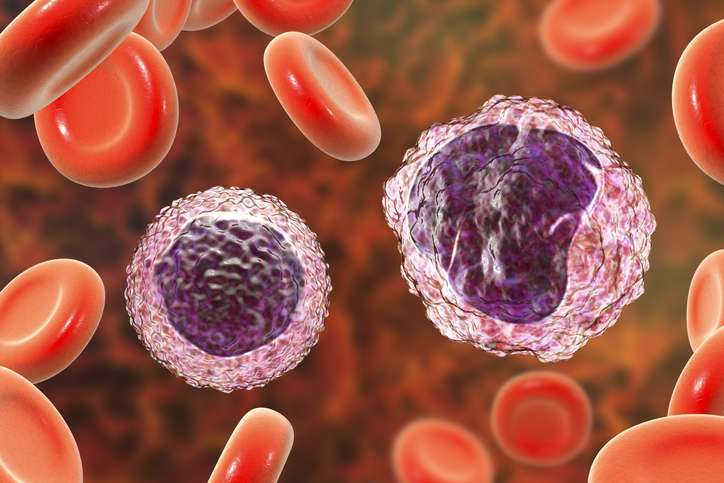Non-covalent BTK inhibitor LOXO-305 shows promising results in advanced B-cell malignancies
Bruton’s tyrosine kinase (BTK) plays an essential role in the B-cell antigen receptor signaling pathway and is required for the development and function of normal and malignant B-cells, making it a major drug target for B-cell malignancies.1
LOXO-305 is a highly selective, non-covalent BTK inhibitor able to overcome the presence of acquired resistance mediated by BTK cysteine 481 (C481), deliver high target coverage regardless of BTK turnover rate and avoid off-target kinases – aspects that have limited the use and development of both covalent and investigational non-covalent BTK inhibitors.2 The Phase I/II BRUIN trial (NCT03740529) evaluated the safety and early efficacy of LOXO-305 in 323 patients with advanced B-cell malignancies who have received ≥2 prior therapies.3,4
At the virtual 62nd American Society of Hematology (ASH) Annual Meeting and Exposition, Anthony Mato, MD, of Memorial Sloan Kettering Cancer Center, New York, NY, presented the latest results from the study in 170 patients with previously treated chronic lymphocytic leukemia (CLL) and small lymphocytic lymphoma (SLL).3
In the CLL/SLL cohort, patients had received a median of three prior lines of therapy (range: 1–11); 86% (n=146/170) of patients received a prior BTK inhibitor, 21% (n=36/170) had received a phosphatidylinositol-3-kinase (PI3K) inhibitor, and 34% (n=57/170) had received venetoclax. In addition, molecular characterization revealed 25% (n=20/81) of patients having 17p deletion, 30% (n=27/91) with a TP53 mutation, and 88% (n=71/81) were unmutated for IGHV.3
In 139 of the efficacy-evaluable patients with CLL/SLL treated across all dose levels, the overall response rate (ORR) was 63% (95% CI: 55–71). The response increased over time, to 86% in patients followed for more than ≥10 months. The ORR was similar regardless of the number of other prior therapies, prior progression with a BTK inhibitor or other therapies, or presence of BTK C481 mutations. At the efficacy cutoff date, 94% (n=83/88) of responding patients with CLL/SLL remained on therapy and in response.3
The safety analysis presented at the meeting included all 323 patients enrolled in the BRUIN trial. There were no dose-limiting toxicities (DLTs) and the maximum tolerated dose (MTD) was not reached. The treatment-emergent adverse events (TEAEs), regardless of attribution or grade, observed in ≥10% of patients (n=323) were fatigue (20%, n=65/323), diarrhea (17%, n=55/323), and contusion (13%, n=42/323). Of these, the only grade 3 toxicity reported was fatigue. The rate of discontinuation due to treatment-related adverse events (AEs) was 1.5% (n=5/323).3
In an interview with VJHemOnc, Dr Mato reveals that ‘the typical BTK-associated AEs like atrial fibrillation, bleeding, arthralgias and others are extremely rare. Atrial fibrillation occurred in less than 1% of patients and grade 3 hemorrhage occurred in less than 1% of patients.’
Additionally, during the 2020 ASH Annual Meeting, Michael Wang, MD, of the University of Texas MD Anderson Cancer Center, Houston, TX, reported results from the BRUIN study from the following disease cohorts: mantle cell lymphoma (MCL) (n=61), Waldenström’s macroglobulinemia (WM) (n=26) and other non-Hodgkin lymphomas (NHLs) (n=66), including diffuse large B-cell lymphoma, follicular lymphoma, marginal zone lymphoma, B-cell prolymphocytic leukemia, and Richter’s transformation.4
Among the 153 patients with NHLs, the median number of prior lines of therapy was 3 for MCL (range 1–8), 3 for WM (range 2–11), and 4 for other NHLs (range 2–10). Similar to the CLL/SLL cohort, patients were heavily pretreated. Around 93% (n=57/61) of patients with MCL and 69% (n=18/26) with WM received a prior BTK inhibitor. Additionally, 3 patients in the MCL cohort (5%) and 14% (n=9/66) of those with other NHLs had received CAR T-cell therapy.4
The ORRs varied across the different disease cohorts. In 56 response-evaluable patients with MCL the ORR was 52% (95% CI: 38–65), the ORR remained at 52% (95% CI: 38–66) when analyzing patients in the BTK pre-treated group (n=52). In this subgroup of patients, n=13/52 (25%) achieved a complete response. Additionally, at a median follow-up of 6 months, n=24/29 (83%) patients with an initial response to LOXO-305 had an ongoing response.4
Patients with WM who were evaluable for response (n=19) had an ORR of 68% (95% CI: 44–87) which was consistent with the BTK pre-treated group (n=13; 69% [95% CI: 39–91]). ORRs reported in other NHLs were 75% (95% CI: 35–97) for Richter transformation, 50% (95% CI: 16–84) for follicular lymphoma, 24% (95% CI: 9–45) for diffuse large B-cell lymphoma, and 22% (95% CI: 3–60) for marginal zone lymphoma.4
However, ‘the shortcoming of this data is that the follow-up time is relatively short’, Dr Wang added. Although these are preliminary results and longer follow-up is needed, LOXO-305 could be a potentially effective treatment option for advanced B-cell malignancies.
Written by Marta Palhas
References:
1 – Pal Singh, S., Dammeijer, F., & Hendriks, R. Role of Bruton’s tyrosine kinase in B cells and malignancies. Molecular Cance. 2018 Feb; 17(1).
2 – Eli Lilly and Company. Loxo Oncology at Lilly Announces Updated Data from the Phase 1/2 BRUIN Clinical Trial for LOXO-305 in Chronic Lymphocytic Leukemia and Small Lymphocytic Lymphoma at the American Society of Hematology Annual Meeting. PRNewswire. Available from: https://www.prnewswire.com/news-releases/loxo-oncology-at-lilly-announces-updated-data-from-the-phase-12-bruin-clinical-trial-for-loxo-305-in-chronic-lymphocytic-leukemia-and-small-lymphocytic-lymphoma-at-the-american-society-of-hematology-annual-meeting-301186873.html (Last accessed 22/02/21)
3 – Mato AR, Pagel JM, Coombs CC, et al. LOXO-305, a next generation, highly selective, non-covalent BTK inhibitor in previously treated CLL/SLL: results from the phase 1/2 BRUIN study. Presented at: the 62nd American Society of Hematology (ASH) Annual Meeting and Exposition; December 5–9, 2020. Abstract 542.
4 – Wang M, Shah NN, Alencar AJ, et al. LOXO-305, a next generation, highly selective, non-covalent BTK inhibitor in previously treated mantle cell lymphoma, Waldenström’s macroglobulinemia, and other non-Hodgkin lymphomas: Results from the phase 1/2 BRUIN study. Presented at: the 62nd American Society of Hematology (ASH) Annual Meeting and Exposition; December 5–9, 2020. Abstract 117.











